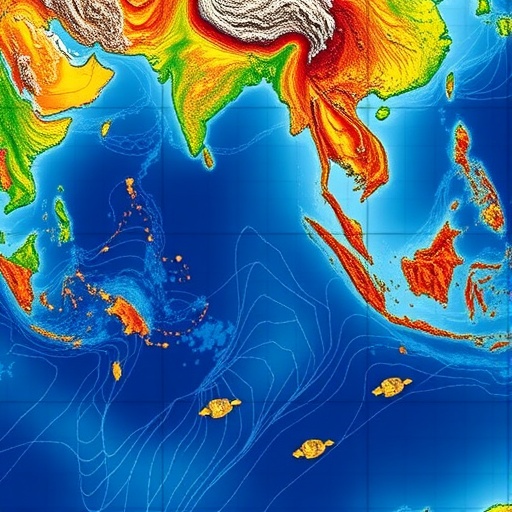As the health of global marine biodiversity faces unprecedented threats from accelerating climate change, pervasive pollution, and widespread overexploitation of ocean resources, the imperative to unravel the intricate dynamics governing oceanic ecosystems has never been more critical. The Asia-Pacific region (APR), renowned for harboring the planet’s richest and most diverse marine life, emerges as a focal point in this urgent environmental narrative. Yet, despite the abundance of ecosystems and data, efforts to monitor and protect these invaluable marine realms remain fragmented, siloed by national borders and disciplinary boundaries, limiting the potential for coherent, large-scale understanding and effective conservation strategies.
In a groundbreaking initiative, a coalition of multidisciplinary researchers spanning multiple countries within the APR have collaboratively produced a visionary perspective published in Frontiers in Marine Science that emphasizes the power and necessity of integrating physical oceanography, environmental genomics, and ecological monitoring. Their work advocates for a harmonized, cross-border approach to marine biodiversity surveillance that transcends traditional data barriers. This integrated framework promises to propel marine science forward by fostering international partnerships, unifying disparate datasets, and facilitating breakthroughs unattainable by isolated national efforts.
This scholarly publication, released on October 23, 2025, elucidates a critical shortcoming pervasive in current marine research paradigms: despite voluminous oceanographic and biological data being collected globally, much of this information remains compartmentalized in country-specific repositories. The authors argue that without transparent and coordinated data sharing, the scientific community is fraught with inefficiencies and blind spots, ultimately impeding the ability to detect ecological trends, forecast shifts attributable to climate resilience or degradation, and enact timely, evidence-based protection of marine habitats.
Hanani Adiwira, the study’s lead author and a prominent figure at the Advanced Institute for Marine Ecosystem Change (WPI-AIMEC), stresses the transformative potential of open data cultures within the APR marine science community. Adiwira highlights that an integrated, high-resolution understanding of ecosystem changes, species adaptation mechanisms, and ocean climate responses hinges on data transparency and interoperability. She notes that without such collaborative infrastructure, scientific assessments will be patchy, goals for ecosystem renewal will falter, and irreversible damage may continue unchecked.
This comprehensive review synthesizes extant scientific literature while critically evaluating existing international data-sharing platforms like the Argo program—a global array of autonomous floats measuring ocean temperature and salinity—and ANEMONE, a collaborative ocean monitoring initiative. These programs exemplify how standardized, transparent frameworks can yield transformative insights when designed for global participation. Drawing lessons from these precedents, the authors propose the establishment of a robust interdisciplinary and multinational monitoring system purpose-built for the rich and complex APR seascapes.
Beyond theoretical discourse, the study incorporates pragmatic inputs obtained during an intensive workshop co-hosted at Tohoku University, where star researchers from numerous APR nations convened to brainstorm operationalizing data-sharing frameworks that address region-specific impediments. The workshop underscored challenges unique to the Asia-Pacific—ranging from geopolitical complexities and technological disparities to ecological heterogeneity—while underscoring the collective determination to surmount these obstacles via unified efforts.
The APR’s marine ecosystems hold profound socioeconomic and cultural significance for millions of inhabitants, underpinning fisheries, tourism, and traditional lifestyles. This intrinsic value magnifies the urgency to refine and advance strategies for ecosystem stewardship. By augmenting how researchers measure, analyze, and disseminate ocean data, the proposed integrative infrastructure is poised to enhance ecosystem management, safeguard biodiversity hotspots, and bolster the resilience of coastal communities in the face of accelerating environmental pressures.
At the heart of this endeavor is the Advanced Institute for Marine Ecosystem Change (WPI-AIMEC), a collaborative research entity operated jointly by Tohoku University and JAMSTEC under Japan’s World Premier International Research Center Initiative (WPI). WPI-AIMEC’s mission is to pioneer predictive models and systematic frameworks that elucidate how marine ecosystems respond to complex Earth system dynamics. By fusing oceanographic sciences, ecological theory, and cutting-edge data science, the institute aspires to inaugurate a novel interdisciplinary field dubbed “Ocean and Ecosystem Change Systematics” (OECS), catalyzing planetary stewardship aimed at ecosystem restoration and resilience.
By promoting open, cooperative research cultures and cultivating trained global talent equipped to confront marine challenges, WPI-AIMEC exemplifies the future of ocean science. Their leadership in creating international networks and data-sharing consortia within the APR sets a new paradigm emphasizing inclusivity, transparency, and innovation, critical to transforming marine biodiversity research from an assemblage of isolated endeavors into a cohesive global enterprise.
The implications of the study resonate far beyond academic spheres; improved integrated ocean monitoring promises more precise environmental forecasting, better management of fisheries, and enhanced policymaking tailored to the complex interactions between physical ocean processes and ecosystem health. As climate change continues to alter oceanic conditions through warming, acidification, and deoxygenation, such comprehensive data integration efforts become indispensable to adaptive management and sustainable exploitation.
In sum, this pioneering research delineates clear pathways toward transforming fragmented marine science within the Asia-Pacific into coordinated, actionable knowledge networks. By foregrounding the necessity of data transparency, regional cooperation, and interdisciplinary synergy, it charts an actionable roadmap toward safeguarding marine biodiversity and the countless human communities entwined with it.
Subject of Research: Integrated marine ecosystem monitoring in the Asia-Pacific region
Article Title: Pathways to an integrated understanding of marine environments and ecosystems in the Asia-Pacific Region
News Publication Date: 23-Oct-2025
Web References: DOI:10.3389/fmars.2025.1680145
Image Credits: ©Tohoku Forum of Creativity
Keywords: Marine ecosystems, Science policy, Scientific community, Data availability, Asia, Ocean policy, Oceans




